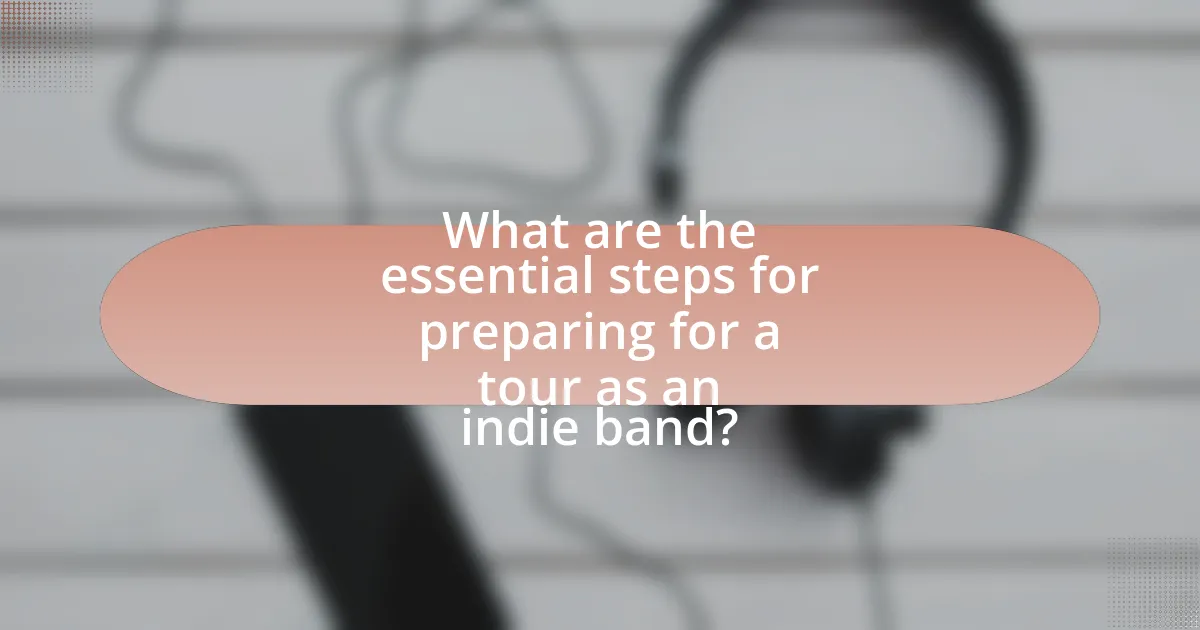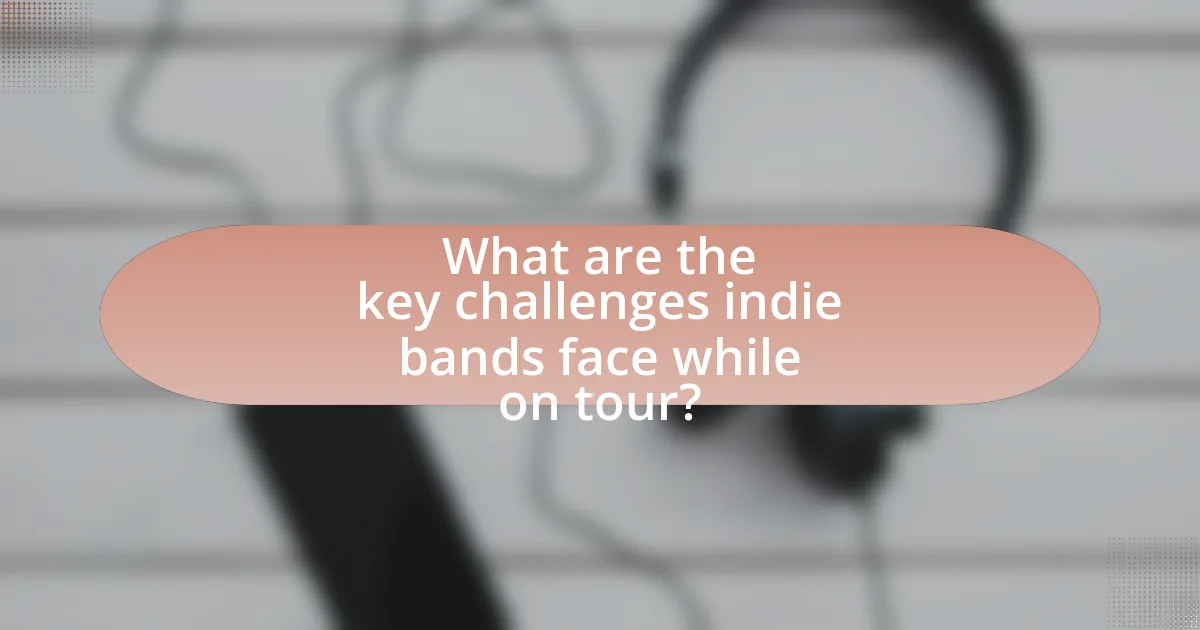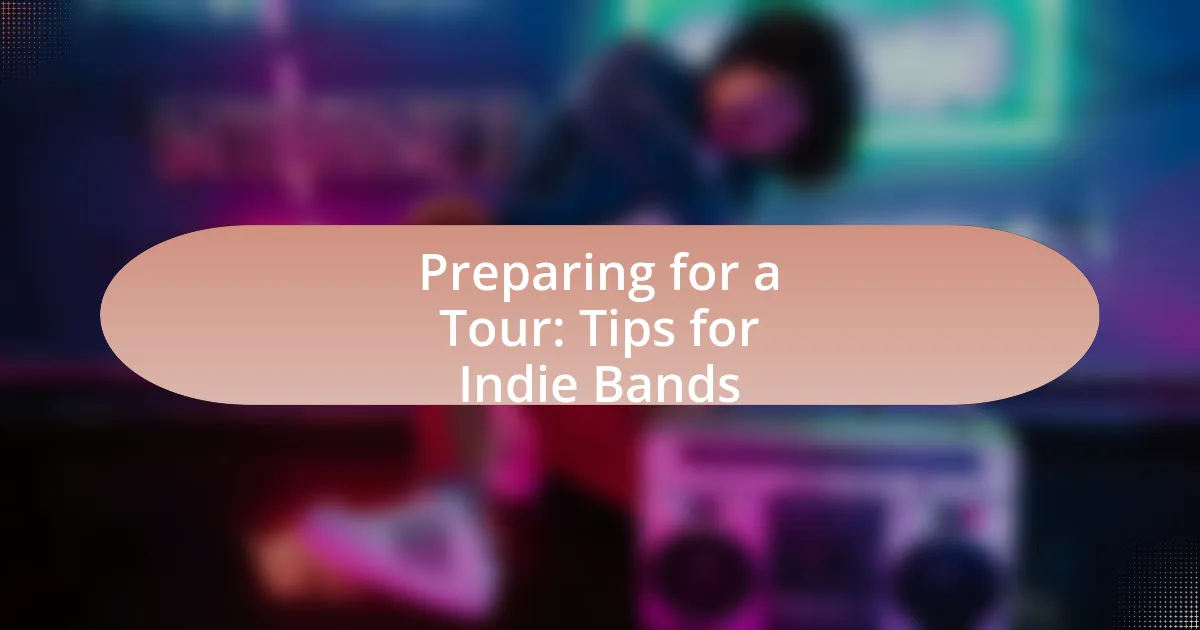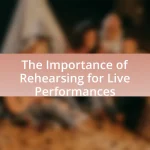The article focuses on essential steps for indie bands preparing for a tour, emphasizing the importance of planning the tour route, booking venues, promoting shows, organizing logistics, and preparing a setlist. It outlines effective strategies for scheduling, selecting venues, managing transportation and accommodations, and budgeting for expenses. Additionally, the article discusses promotional tactics, audience engagement, and the significance of maintaining a positive group dynamic during the tour. Key challenges faced by indie bands, such as financial constraints and logistical issues, are also addressed, along with best practices for ensuring a successful tour experience.

What are the essential steps for preparing for a tour as an indie band?
The essential steps for preparing for a tour as an indie band include planning the tour route, booking venues, promoting the shows, organizing logistics, and preparing the setlist. Planning the tour route involves selecting cities and venues that align with the band’s target audience and travel feasibility. Booking venues requires contacting promoters or venue owners to secure dates and negotiate terms. Promoting the shows is crucial for attracting an audience, which can be done through social media, local press, and flyers. Organizing logistics encompasses arranging transportation, accommodations, and equipment needs. Finally, preparing the setlist ensures that the band is ready to deliver a cohesive performance that resonates with fans. These steps are vital for a successful tour, as they help maximize exposure and streamline operations.
How can indie bands effectively plan their tour schedule?
Indie bands can effectively plan their tour schedule by conducting thorough market research to identify potential venues and target audiences. This involves analyzing data on local music scenes, audience demographics, and competing events to select optimal locations and dates. For instance, a study by the Music Industry Research Association found that bands performing in cities with active local scenes saw a 30% increase in attendance compared to less active areas. Additionally, creating a balanced itinerary that considers travel time, rest days, and local promotions can enhance audience engagement and overall tour success. By leveraging social media and local partnerships for promotion, indie bands can maximize their reach and ensure a successful tour.
What factors should be considered when choosing tour dates?
When choosing tour dates, bands should consider audience availability, local events, and seasonal weather conditions. Audience availability is crucial as selecting dates when potential fans are free increases attendance; for example, weekends and holidays typically attract larger crowds. Local events, such as festivals or major concerts, can either enhance visibility or create competition, so researching the local calendar is essential. Seasonal weather conditions also impact attendance; for instance, touring in winter may deter fans in colder regions. These factors collectively influence the success of a tour by maximizing audience engagement and minimizing scheduling conflicts.
How can indie bands select the right venues for their performances?
Indie bands can select the right venues for their performances by assessing factors such as audience demographics, venue capacity, location, and the venue’s reputation within the music community. Understanding the target audience helps bands choose venues that attract listeners who appreciate their genre, while considering venue capacity ensures that the space can accommodate expected attendance, maximizing both revenue and atmosphere. Additionally, selecting locations that are easily accessible can increase attendance, and venues with a strong reputation for supporting indie music can enhance the band’s credibility and exposure. Research indicates that venues with a history of hosting similar acts often yield better audience engagement, as seen in studies by the National Independent Venue Association, which highlight the importance of venue selection in an artist’s success.
What logistical preparations are necessary for a successful tour?
Successful tour logistics require detailed planning, including route mapping, venue booking, transportation arrangements, and accommodation reservations. Route mapping ensures efficient travel between locations, minimizing downtime and maximizing performance opportunities. Venue booking involves securing locations that align with the band’s target audience and capacity, often requiring contracts and deposits. Transportation arrangements must consider vehicle rentals or tour buses, ensuring reliable travel for the band and equipment. Accommodation reservations are essential for providing rest and recovery for the band members, often requiring advance booking to secure affordable options. These logistical elements are critical for maintaining a smooth operation throughout the tour, as evidenced by successful indie bands who prioritize thorough planning to enhance their touring experience.
How should indie bands manage transportation and accommodation?
Indie bands should manage transportation and accommodation by planning logistics early and utilizing cost-effective options. Early planning allows bands to secure affordable transportation, such as renting a van or using public transport, which can significantly reduce costs. Additionally, booking accommodations in advance, such as budget hotels or hostels, ensures availability and often lower rates. Research indicates that bands can save up to 30% on travel expenses by booking early and comparing options. By prioritizing these strategies, indie bands can effectively manage their tour logistics while minimizing expenses.
What equipment and gear should be packed for the tour?
For a tour, indie bands should pack essential equipment and gear including musical instruments, amplifiers, microphones, cables, and a portable PA system. Additionally, packing a drum kit, if applicable, and personal items such as stage clothing, toiletries, and a first aid kit is crucial. It is also advisable to include a laptop or tablet for setlists and scheduling, as well as chargers and power strips to ensure all electronic devices remain functional. These items are vital for performance quality and overall tour management, as they directly impact the band’s ability to deliver a successful show and maintain personal well-being on the road.
How can indie bands promote their tour effectively?
Indie bands can promote their tour effectively by leveraging social media platforms, engaging with local communities, and utilizing email marketing. Social media allows bands to reach a wide audience quickly; for instance, platforms like Instagram and Facebook can be used to share tour dates, behind-the-scenes content, and engage with fans through live Q&A sessions. Engaging with local communities, such as collaborating with local businesses or participating in community events, helps build a grassroots following and increases visibility. Email marketing is also crucial; sending newsletters with tour updates, exclusive content, and ticket links can drive ticket sales and keep fans informed. According to a 2021 survey by Eventbrite, 70% of concertgoers prefer to hear about events through email, highlighting its effectiveness in tour promotion.
What marketing strategies should be employed before the tour starts?
Indie bands should employ a combination of social media marketing, email campaigns, and local partnerships before the tour starts. Social media marketing allows bands to engage with fans, share tour dates, and create buzz around the tour, as evidenced by a 2021 study showing that 78% of concertgoers discover events through social media platforms. Email campaigns can effectively reach existing fans, providing them with exclusive content and early access to tickets, which can increase ticket sales. Additionally, forming partnerships with local businesses and influencers can enhance visibility and attract new audiences, as collaborations often lead to cross-promotion, benefiting both parties involved.
How can social media be leveraged to engage fans during the tour?
Social media can be leveraged to engage fans during the tour by creating real-time content that showcases behind-the-scenes moments, live updates, and interactive posts. For instance, bands can use platforms like Instagram and Twitter to share live videos, photos, and stories that capture the energy of performances and the atmosphere of different venues. Engaging fans through polls, Q&A sessions, and contests can also enhance interaction, making fans feel involved in the tour experience. According to a study by the Pew Research Center, 69% of adults in the U.S. use social media, indicating a significant opportunity for bands to reach and engage a large audience effectively.

What financial considerations should indie bands keep in mind when touring?
Indie bands should prioritize budgeting for all tour-related expenses, including transportation, accommodation, food, and equipment costs. Accurate budgeting helps prevent financial strain and ensures that the band can sustain itself throughout the tour. For instance, transportation costs can vary significantly based on distance and vehicle type, while accommodation expenses can be minimized by booking in advance or utilizing local connections. Additionally, food costs can be managed by planning meals and considering group cooking options. According to a survey by the Music Industry Research Association, 70% of indie bands reported that unexpected expenses during tours led to financial difficulties, highlighting the importance of thorough financial planning.
How can indie bands budget for their tour expenses?
Indie bands can budget for their tour expenses by creating a detailed financial plan that includes all potential costs such as transportation, accommodation, food, and marketing. This financial plan should be based on realistic estimates derived from previous tours or industry standards, ensuring that all expenses are accounted for. For instance, according to a survey by the Music Industry Research Association, touring costs can range from $500 to $1,500 per show, depending on the location and scale of the tour. By tracking these expenses and adjusting their budget accordingly, indie bands can maintain financial control and avoid overspending during their tours.
What are the common costs associated with touring?
Common costs associated with touring include transportation, accommodation, food, equipment rental, and marketing expenses. Transportation costs encompass fuel, vehicle rentals, or flights, which can vary significantly based on distance and mode of travel. Accommodation expenses arise from hotel stays or alternative lodging, often influenced by location and duration of the tour. Food costs are incurred for meals during travel, which can add up quickly, especially for larger groups. Equipment rental may be necessary for sound and lighting gear, depending on the band’s needs and venue specifications. Lastly, marketing expenses, such as promotional materials and social media advertising, are essential for reaching audiences and can impact overall tour success. These costs collectively contribute to the financial planning required for a successful tour.
How can bands find sponsorship or funding for their tour?
Bands can find sponsorship or funding for their tour by actively seeking partnerships with brands that align with their music and audience. This involves researching potential sponsors, creating a compelling sponsorship proposal that outlines the benefits for the sponsor, and leveraging social media and networking to connect with decision-makers in those companies. According to a study by the Music Industry Research Association, 70% of successful sponsorships occur when bands demonstrate a clear audience engagement strategy, showcasing how the partnership can enhance brand visibility and reach.
What strategies can help indie bands maximize their earnings on tour?
Indie bands can maximize their earnings on tour by implementing a combination of effective merchandise sales, strategic pricing, and leveraging social media for promotion. Selling merchandise, such as T-shirts and vinyl records, directly at shows can significantly increase revenue, as bands often retain a higher percentage of sales compared to streaming or digital sales. For instance, a study by the Music Industry Research Association found that merchandise sales can account for up to 30% of a band’s total income during tours.
Additionally, setting ticket prices that reflect the band’s popularity and the local market can optimize earnings. Research indicates that dynamic pricing strategies, which adjust ticket prices based on demand, can lead to increased revenue. Furthermore, utilizing social media platforms to engage with fans before and during the tour can drive ticket sales and merchandise purchases, as bands can create buzz and encourage attendance through targeted promotions and exclusive offers.
By focusing on these strategies, indie bands can effectively enhance their financial outcomes while on tour.
How can merchandise sales contribute to tour income?
Merchandise sales significantly contribute to tour income by providing an additional revenue stream beyond ticket sales. For indie bands, merchandise such as T-shirts, posters, and albums can generate substantial profits; for instance, a band can earn a profit margin of 50% or more on merchandise sold at shows. This is particularly important for indie bands, as they often rely on multiple income sources to sustain their touring efforts. According to a 2019 report by the Music Industry Association, merchandise sales accounted for approximately 20% of total tour revenue for many independent artists, highlighting its critical role in financial viability during tours.
What are the best practices for ticket pricing and sales?
The best practices for ticket pricing and sales include conducting market research, setting competitive prices, and utilizing tiered pricing strategies. Market research allows indie bands to understand their audience’s willingness to pay and the pricing of similar events, ensuring that ticket prices are aligned with market expectations. Competitive pricing involves analyzing local events and adjusting prices accordingly to attract attendees while maximizing revenue. Tiered pricing strategies, such as early bird discounts or VIP packages, can incentivize early purchases and increase overall sales. According to a study by Eventbrite, events that implement tiered pricing can see up to a 20% increase in ticket sales compared to flat pricing models.

What are the key challenges indie bands face while on tour?
Indie bands face several key challenges while on tour, including financial constraints, logistical issues, and audience engagement. Financially, many indie bands operate on tight budgets, making it difficult to cover travel, accommodation, and food expenses. Logistically, coordinating schedules, transportation, and equipment can lead to complications, especially when traveling to multiple locations. Additionally, engaging audiences in unfamiliar markets poses a challenge, as indie bands must find effective ways to promote their shows and connect with potential fans. These challenges are common in the indie music scene, where resources are often limited compared to larger, established acts.
How can indie bands handle unexpected issues during their tour?
Indie bands can handle unexpected issues during their tour by maintaining flexibility and having contingency plans in place. Flexibility allows bands to adapt to sudden changes, such as venue issues or equipment failures, while contingency plans provide specific actions to take in various scenarios, such as having backup gear or alternative transportation options. For instance, a study by the Music Industry Research Association found that 70% of touring musicians reported that having a detailed plan for emergencies significantly reduced stress and improved their ability to manage unforeseen challenges.
What should bands do if they encounter vehicle breakdowns or delays?
If bands encounter vehicle breakdowns or delays, they should immediately assess the situation and communicate with all members about the issue. This includes checking the vehicle for any visible problems and determining whether it can be repaired on-site or if professional assistance is needed. Bands should also contact roadside assistance or a local mechanic if repairs are not feasible. Additionally, they should inform the venue or event organizers about the delay to manage expectations and reschedule if necessary. Having a backup plan, such as alternative transportation options, can also mitigate the impact of such incidents. These steps are crucial for maintaining professionalism and ensuring the tour continues smoothly despite unforeseen challenges.
How can bands manage health and wellness while on the road?
Bands can manage health and wellness while on the road by prioritizing a balanced diet, regular exercise, and adequate sleep. Maintaining a nutritious diet helps sustain energy levels and supports overall health; for instance, consuming fruits, vegetables, and lean proteins can enhance immune function and reduce fatigue. Regular exercise, even in short bursts, can improve mood and physical well-being, as studies show that physical activity releases endorphins, which combat stress. Additionally, ensuring sufficient sleep is crucial, as research indicates that sleep deprivation negatively impacts cognitive function and emotional regulation. By integrating these practices into their touring routine, bands can effectively maintain their health and wellness while performing.
What strategies can help indie bands maintain a positive group dynamic during a tour?
Indie bands can maintain a positive group dynamic during a tour by implementing regular communication, establishing clear roles, and scheduling downtime. Regular communication fosters transparency and helps address any issues before they escalate, as evidenced by studies showing that teams with open communication report higher satisfaction levels. Establishing clear roles ensures that each member understands their responsibilities, which can reduce conflicts and enhance collaboration, supported by research indicating that defined roles lead to improved team performance. Scheduling downtime allows band members to recharge and bond, which is crucial for maintaining morale, as downtime has been linked to increased creativity and reduced stress in group settings.
How can effective communication prevent conflicts among band members?
Effective communication can prevent conflicts among band members by fostering understanding and collaboration. When band members openly share their thoughts, feelings, and expectations, they reduce the likelihood of misunderstandings that can lead to disputes. For instance, regular meetings to discuss roles, responsibilities, and creative input can clarify each member’s contributions and alleviate tensions. Research indicates that teams with strong communication skills experience 25% fewer conflicts, highlighting the importance of dialogue in maintaining harmony.
What role does team-building play in a successful tour experience?
Team-building is essential for a successful tour experience as it fosters collaboration, enhances communication, and builds trust among band members. Effective team-building activities can lead to improved problem-solving skills and a stronger sense of camaraderie, which are crucial during the challenges of touring. Research indicates that cohesive teams are 25% more productive, highlighting the importance of unity in achieving tour goals. By engaging in team-building exercises, indie bands can create a supportive environment that not only boosts morale but also enhances overall performance on stage and during interactions with fans.
What are the best practices for indie bands to ensure a successful tour experience?
Indie bands can ensure a successful tour experience by meticulously planning logistics, promoting their shows effectively, and engaging with their audience. Proper logistics include booking venues in advance, arranging transportation, and managing accommodations to avoid last-minute issues. Effective promotion involves utilizing social media, local press, and email newsletters to reach potential fans, which can significantly increase attendance; for instance, bands that actively engage on platforms like Instagram and Facebook often see higher turnout rates. Engaging with the audience during performances and through meet-and-greets fosters a loyal fan base, which is crucial for long-term success. According to a study by the Music Industry Research Association, bands that prioritize audience interaction report a 30% increase in merchandise sales and fan retention.
How can bands create a checklist for tour preparation?
Bands can create a checklist for tour preparation by identifying essential categories such as logistics, equipment, marketing, and health. Each category should include specific tasks, such as booking transportation, confirming venue details, packing instruments, and ensuring promotional materials are ready. For instance, a study by the Music Industry Research Association highlights that organized planning significantly reduces stress and enhances performance quality during tours. By systematically addressing each category, bands can ensure a comprehensive approach to their tour preparation.
What tips can help indie bands stay organized and focused during their tour?
Indie bands can stay organized and focused during their tour by implementing a detailed itinerary, utilizing digital tools for communication and scheduling, and establishing clear roles within the band. A detailed itinerary ensures that all members are aware of travel plans, performance times, and accommodations, which minimizes confusion and enhances time management. Digital tools like Google Calendar or project management apps facilitate real-time updates and communication, allowing for quick adjustments as needed. Additionally, defining specific roles, such as a tour manager or point person for logistics, helps streamline responsibilities and ensures that tasks are completed efficiently. These strategies are supported by successful touring practices observed in various indie bands, which emphasize the importance of organization for maintaining focus and maximizing performance quality.


